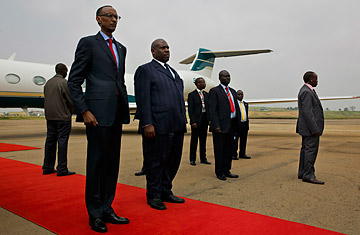
Uganda, Entebbe, 2012. President of the Republic of Rwanda Paul Kagame arrives in Uganda to take part in the a Great Lakes summit, joins the host President Yoweri Museveni, DRC's Joseph Kabila and other East African Head of State's, to discuss the insecuritues in Eastern Congo.
Rwanda sits at the heart of Africa, Kigali is at the center of Rwanda, and on a wooded ridge bisecting the city sits a single-story complex of government buildings where, at most hours of most days, you'll find President Paul Kagame at his desk. But it isn't just geography and hard work that make Kagame an ever more central figure in Africa. The rebel commander who rescued his country from genocide as the world hesitated in 1994 has since led Rwanda to a stunning rebirth as its President. In the past 10 years, economic growth in Rwanda has averaged 8.2%, aid funding of the national budget has fallen from 85% to 41%, child mortality has halved and primary-school attendance has tripled. His record makes Kagame the embodiment of a new Africa suddenly bursting with growth and opportunity.
But lately, Kagame, 54, is attracting attention for other reasons. Human-rights groups have long characterized him as an autocrat. Critics focus on his 90%-plus election victories, the violent deaths of several opponents and the proximity of Rwanda's economic success to Congo's blood minerals — rich mines of gold, coltan and other minerals controlled by rebel militias. On June 27 the mounting accusations reached a crescendo: U.N. monitors in the Democratic Republic of Congo accused Kagame of backing a rebellion in eastern Congo whose leader is wanted for war crimes. The allegations set off a firestorm of global condemnation. Human Rights Watch described him as a "dictator" backing "a murderous rebel force." The rebels' advance on the city of Goma, said the British aid group Oxfam, had created a "catastrophic humanitarian crisis" encompassing half a million refugees. The U.S., Britain, Germany, Sweden, the Netherlands and the African Development Bank suspended varying amounts of aid. Foreign press coverage was ferocious. Britain's Guardian quoted a former aide to Bill Clinton saying the world was "sick of being lied to" by Kagame and blackmailed for its inaction over the 1994 genocide — and in another article speculated that Kagame himself would face war-crimes charges.
As crisis bore down on Kagame, he granted TIME seven hours of interviews over five days. Charming, engaging and razor-sharp, Kagame's angry frustration with the allegations against him was nonetheless clear. To his detractors, he is the former star of the new Africa now revealing himself as a very old-African tyrant. To Kagame, the controversy reveals less about an African leader at odds with the world than it does about a world at odds with the rise of newly confident and powerful Africa.
Much rests on the uneasy relationship between Kagame and the West. In its balance lies the future of Congo, where hundreds of thousands have died in war and instability in the past 15 years. It is also a fight for Rwanda's, and to some extent Africa's, name: whether the continent is to be seen as a lost vortex of dictators, disasters and babies with flies in their eyes, or an emergent giant whose dramatic improvement grants it new freedoms, new authority and new position in a world in which the West no longer has a lock on any of those.
For Kagame, it is the same fight he has been having all his life: to be free. Consider his life, he says, from exile to rebel to genocide vanquisher to overseer of extraordinary regeneration. "Do I not know what it means to be free, to express yourself, to have justice, to be treated fairly?" There is a moment in our first interview when Kagame trails off and stares into space; when he resumes, he speaks in a low, distant voice. "From our side, there are things we want to live for and are ready to die for — things we cannot deviate from," he says. "You cannot threaten us. We have had worse things. We have already sunk to the lowest level. [This is about] our rights. It's about how we survive. And nobody is going to do it for us. Nobody is going to do it for us."
No Saint
Meeting Kagame is a reminder of how easy it might be to figure him for an autocrat. He is tall, skinny and formal; his English is clipped by a heavy French accent; his natural expression is a down-turned mouth and narrowed eyes. From three previous encounters, I know him as a debater with a keen ear for absurdity, but the initial impression is of cold steel. When I open our interview by remarking that while some of his press coverage may be overdone, I'm not there to paint him as a saint, he replies: "I don't want to be. That would mean doing nothing I am supposed to. We have done what we needed to. If we hadn't, we wouldn't be here today."
